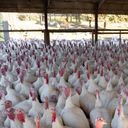How America's turkey supply chain brings birds to your table

The route that your turkey took on its way to your table this year was beset by extreme weather, global supply-chain issues and labor shortages — many of the same factors contributing to the "Everything Shortage."
The big picture: Our Axios Local teams have turned their eye to each piece of the turkey supply chain — from Iowa, one of the top producers of animal feed nationwide; to Minnesota, the biggest turkey producer; to Arkansas, home of Walmart, the country's largest retailer.
The feed
Iowa's dominance in corn and soybean production makes it a top producer of animal feed.
- Yes, but: Its farmers faced layers of challenges this last year, ranging from extreme weather conditions to a spike in global demand, resulting in skyrocketing feed prices for the rest of the U.S.
Extreme drought conditions in the majority of the state this spring fed into rising corn costs, as farmers questioned how much yield they could produce.
- Meanwhile, there's been a spike in global demand for corn, particularly from China, meaning there are more dollars chasing fewer supplies.
- That's resulting in higher feed prices for livestock producers, who were already under financial stress from 2020's disrupted food supply chain, said Lee Schulz, an economics professor at Iowa State University.
The turkeys
Minnesota farms produce around 45 million heads of turkey a year, according to the U.S. Department of Agriculture.
- Jennie-O Turkey Store, a subsidiary of Minnesota-based Hormel, is the second-largest turkey producer in the country, as of 2019.
State of play: The resurgence of family Thanksgivings, after 2020's pandemic disruption, might not be that lucrative for Minnesota farmers.
- Although the USDA has predicted record-high prices for birds this year, they'll be offset by those higher feed prices, according to MPR News.
- There's also been a supply chain disruption for a key feed supplement made in China.
To your table
These supply chain disruptions shouldn't affect your ability to bring home a turkey this year, as Axios' Erica Pandey reported.
- But Butterball CEO Jay Jandrain did say that smaller turkeys are in shorter supply than usual. Demand is high because people are still being COVID-cautious and planning smaller gatherings.
- Labor shortages at meatpacking plants also prompted many suppliers to wait longer before processing turkeys, and the birds kept getting bigger in the meantime.
What to expect: Customers are shopping for their Thanksgiving meals earlier than usual this year, Walmart spokesperson Trica Moriarty tells Axios.
- "Walmart will have plenty of turkeys for the Thanksgiving holiday," Moriarty says.
- Concerns of a turkey shortage drove an early surge in sales, Charles Redfield, the company’s executive vice president of food, said in a statement. In October, frozen turkey sales were up more than 100% compared to last year.
- "Because our merchants anticipated customers would shop earlier, we planned ahead and secured ample supply," Redfield said.
Axios' Alex Golden, Nick Halter and Linh Ta contributed to this report.
Sign up for Axios Local, now publishing daily newsletters in 14 cities across the U.S. with 11 more coming in 2022.